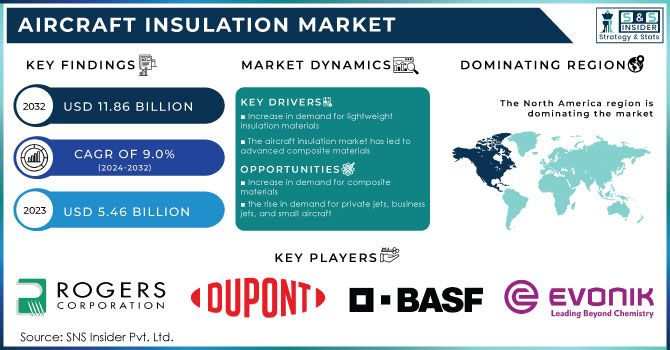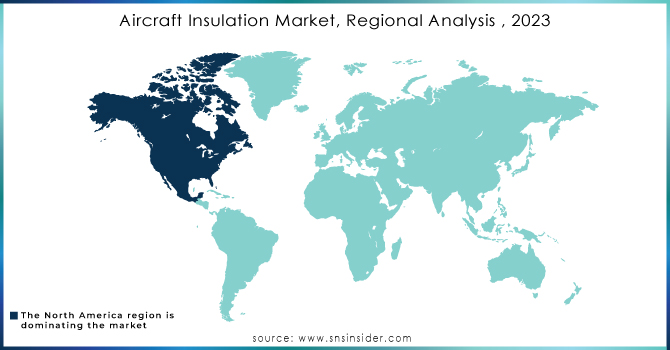Aircraft Insulation Market Report Scope & Overview:

To get more information on Aircraft InsulationMarket - Request Free Sample Report
The Aircraft Insulation Market size was USD 5.46 billion in 2023 and is expected to reach USD 11.86 billion by 2032, growing at a CAGR of 9.0% over the forecast period of 2024-2032.
The aviation protection market is greatly affected by the way manufacturers and painters meet the floods demanded by the lightweight dividers of modern aircraft. Advanced lightweight protectors protect the aircraft externally and internally from water, debris, and ground spills while minimizing movement and vibration. The growing interest in lightweight dividers among aircraft manufacturers is encouraging a new market for aircraft protection. In addition, the cost of composite materials decreases rapidly, giving aircraft manufacturers the opportunity to use aircraft protection compounds. The combinations are simple and can withstand a wide range of limitations such as extreme heat, vibration, and even turbulence, to give some examples. These benefits increase the interest in integrated protection in the aircraft. Aerospace insulation refers to the materials that are installed in the aircraft to improve safety and comfort. Insulation is important in protecting workers and passengers from engine noise and cold temperatures at high altitudes. In emergency situations, the layer provides fire resistance and improves fire prevention.
MARKET DYNAMICS
KEY DRIVERS
-
Increase in demand for lightweight insulation materials
-
increase the use of composite materials to manufacture Aero-structures
-
The aircraft insulation market has led to advanced composite materials
-
high strength, and flexibility, and are lightweight as compared to aluminum or steel
OPPORTUNITIES
-
Increase in demand for composite materials
-
reduce cabin noise
-
the rise in demand for private jets, business jets, and small aircraft
CHALLENGES
-
Insulation reliability issues in more electric aircraft
-
inorganic insulation materials have been used
-
inorganic materials carbon composites are used to insulate the wire
THE IMPACT OF COVID-19
COVID-19 is an unprecedented public health emergency that has affected almost the entire industry, and long-term outcomes are expected to contribute to industry growth during forecasting. Our ongoing research expands our research framework to ensure the inclusion of the underlying problems of COVID-19 and possible alternatives. The report provides information on COVID-19 when considering changes in consumer behavior and demand, purchasing patterns, supply chain reorganization, current market volatility, and significant government interventions. The revised study provides data, analysis, estimates, and predictions, taking into account the impact of COVID-19 on the market.
IMPACT OF UKRAINE AND RUSSIA CRISIS
We are constantly monitoring and updating information on political and economic uncertainties caused by Russia's invasion of Ukraine. Negative consequences are widely anticipated internationally, particularly in Eastern Europe, the European Union, Eastern and Central Asia, and the United States. This dispute has had a serious impact on people's lives and livelihoods, as well as caused significant disruptions in trade patterns. The possible impacts of the ongoing conflict and uncertainty in Eastern Europe are projected to have a negative influence on the global economy, with particularly painful long-term consequences for Russia.
Competitive Landscape
Due to the existence of established players who control the bulk of the market share due to their larger geographical reach and vast product range, the industry has been characterized by strong rivalry. These businesses create a solid business plan in order to respond to market volatility as well as technical and geographical changes. Among the key companies in the global aerospace insulation industry are:
MARKWT ESTIMATIONS
Based on Type Acoustic and vibration insulation, electric insulation, and thermal insulation were all researched in the market.
Based on Material Ceramic-based Materials, Fiberglass, Foamed Plastics, and Mineral Wool were all examined in the market.
Based on Platform Fixed Wing, Rotary Wing, and Unmanned Aerial Vehicles markets were investigated.
Based on Application The market was investigated in terms of Airframe and Propulsion systems.
KEY MARKET SEGMENTATION
By Material
-
Foamed Plastics
-
Fiberglass
-
Mineral Wool
-
Ceramic-based Materials
-
Others
By Platform
-
Fixed Wing
-
Rotary Wing
By Type
-
Acoustic & Vibration Insulation
-
Electric Insulation
By Application
-
Airframe
REGIONAL COVERAGE
North America
-
USA
-
Canada
-
Mexico
Europe
-
Germany
-
UK
-
France
-
Italy
-
Spain
-
The Netherlands
-
Rest of Europe
Asia-Pacific
-
Japan
-
South Korea
-
China
-
India
-
Australia
-
Rest of Asia-Pacific
The Middle East & Africa
-
Israel
-
UAE
-
South Africa
-
Rest of Middle East & Africa
Latin America
-
Brazil
-
Argentina
-
Rest of Latin America

Need any customization research on Aircraft Insulation Market - Enquiry Now
KEY PLAYERS
The Major Players are Duracote Corporation, Rogers Corporation, Dupont, AVS Industries, BASF SE, Evonik Industries, 3M, Zodiac Aerospace, Zotefoams, UPF Corporation, Polymer Technologies Inc, Esterline Technologies Corporation, Triumph Group Inc., Boyd Corporation, Johns Manville, Orcon and Other players.
| Report Attributes | Details |
|---|---|
| Market Size in 2023 | US$ 5.46 Billion |
| Market Size by 2032 | US$ 11.86 Billion |
| CAGR | CAGR of 9% From 2024 to 2032 |
| Base Year | 2023 |
| Forecast Period | 2024-2032 |
| Historical Data | 2020-2022 |
| Report Scope & Coverage | Market Size, Segments Analysis, Competitive Landscape, Regional Analysis, DROC & SWOT Analysis, Forecast Outlook |
| Key Segments | • by Platform (Fixed Wing, Rotary Wing) • by Type (Thermal, Acoustic & Vibration, Electric) • by Material (Foamed Plastics, Fiberglass, Mineral Wool, Ceramic-based Materials) • by Application (Airframe, Engine) |
| Regional Analysis/Coverage | North America (USA, Canada, Mexico), Europe (Germany, UK, France, Italy, Spain, Netherlands, Rest of Europe), Asia-Pacific (Japan, South Korea, China, India, Australia, Rest of Asia-Pacific), The Middle East & Africa (Israel, UAE, South Africa, Rest of Middle East & Africa), Latin America (Brazil, Argentina, Rest of Latin America) |
| Company Profiles | Duracote Corporation, Rogers Corporation, Dupont, AVS Industries, BASF SE, Evonik Industries, 3M, Zodiac Aerospace, Zotefoams, UPF Corporation, Polymer Technologies Inc |
| Key Drivers | • Increase in demand for lightweight insulation materials • increase the use of composite materials to manufacture Aero-structures |
| RESTRAINTS | • Increase in demand for composite materials. • reduce cabin noise. |

